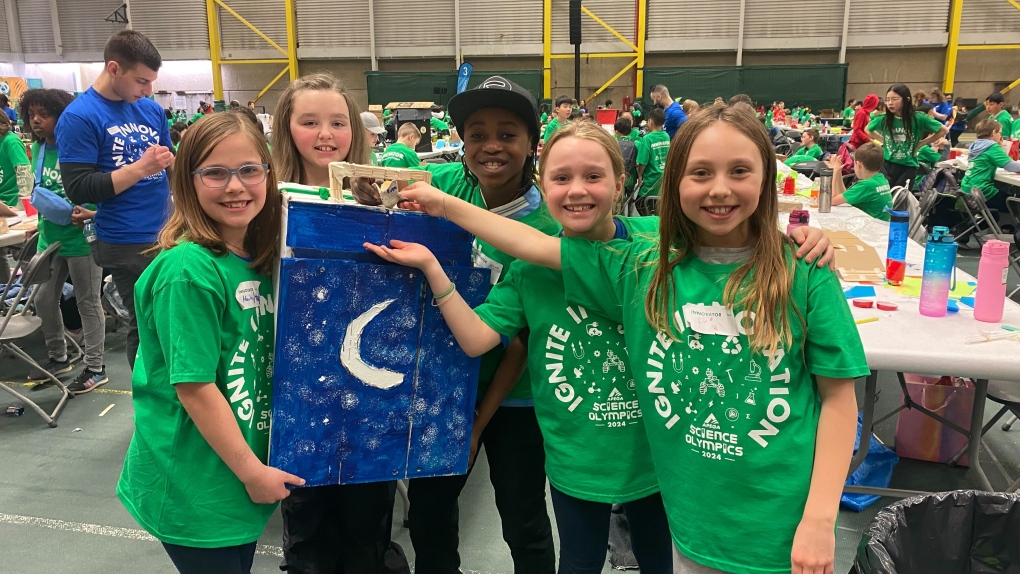Young engineers bring their best to Science Olympics in Edmonton Sunday
Hundreds of students put their critical thinking skills to the test at the Science Olympics at the Butterdome on Sunday.
The event was the largest to date, with 1,200 students from the greater Edmonton area working to find innovative solutions to real-world challenges.
The event was organized by the Association of Professional Engineers and Geoscientists of Alberta (APEGA).
"A big focus of the event is introducing students to science, technology, engineering and math – specifically engineering and geoscience," said Keely McPhee, APEGA outreach coordinator.
"Getting them interested in the careers and able to see the positive impact they have on our lives."
The Olympic challenges were created by scientists, engineers and teachers, and they tie into Alberta school curriculum.
Small teams of students from Grade 1 to 12 were tasked with coming up with solutions and then taking those ideas all the way to a prototype.
"It might not be what you typically think of when you think of the Olympics, because a big part of our event is getting students to reflect on their skills and develop their skills," McPhee said.
A few examples included designing an amphibious vehicle in a simulated swamp, creating a device to measure sound vibrations or inventing a trash can capable of keeping racoons out of residential areas.
 A team of students showcase their racoon-proof garbage can at the 2024 APEGA Science Olympics in Edmonton on April 7, 2024. (Miriam Valdes-Carletti/CTV News Edmonton)Declan Doran's team worked on a critter-resistant trash can. The competition was exciting, he said, but "a little nerve wracking" too.
A team of students showcase their racoon-proof garbage can at the 2024 APEGA Science Olympics in Edmonton on April 7, 2024. (Miriam Valdes-Carletti/CTV News Edmonton)Declan Doran's team worked on a critter-resistant trash can. The competition was exciting, he said, but "a little nerve wracking" too.
"We had a couple disagreements about some stuff that we put on the garbage can itself, but all in all it went well," Doran said.
Rinad Abu Obaiu was proud of how cost-effective her team's project was.
"We only spent so little of the budget - only about $8 out of the $50 that we got. Most of the groups spent about all of it," she added. "We also had a fun time. We got together, we met and we bonded a little bit, so we're friends. It was really cool."
Engineer Junwen Yang coached a team of four students from Meadowlark.
"They worked very hard. They put all their energy [into the project] instead of playing games or whatever," Yang said. "I'm so proud of them."
He said the event is a great way to get kids thinking about science and making outside connections to the curriculum.
"This project helped them to better understand what they learn from the classroom, that's very important," he said.
The first APEGA Science Olympics was held in Edmonton in 1993.
Red Deer will host its own Science Olympics on May 4, and Grande Prairie's will run June 1.
With files from CTV News Edmonton's Miriam Valdes-Carletti
CTVNews.ca Top Stories

Montreal man died of aneurysm after waiting 6 hours in ER
A 39-year-old Montreal man died of an aneurysm after spending six hours in an emergency room before giving up and going home.
Racy photos of Bashar Assad discovered after his fall spark ridicule
Bizarre and personal photos of ousted Syrian President Bashar Assad have surfaced from his abandoned residences, sparking ridicule among Syrians who only until recently were persecuted for criticizing his leadership.
Kennedy’s lawyer has asked the U.S. FDA to revoke its approval of the polio vaccine
U.S. president-elect Donald Trump has praised the polio vaccine as the 'greatest thing,' but a lawyer affiliated with Trump’s pick to lead the country’s top health agency has petitioned the U.S. Food and Drug Administration to revoke approval of the vaccine used in the United States
National Police Federation raises concerns over Manitoba’s border reinforcement plans
The association representing RCMP officers said it’s concerned about the province’s plans for more overtime to help patrol the border.
'We called a Code Silver': LHSC goes into lockdown after shooting outside emergency department
The emergency department (ED) doors at LHSC Victoria Campus were being repaired Saturday morning after a person fired a gun into the glass.
'Smoldering myeloma': Breakthrough research could buy time for those at risk of dangerous cancer
Multiple myeloma is an incurable cancer. An estimated 4,000 Canadians are diagnosed each year, according to the Canadian Cancer Society, with an average survival of eight years after diagnosis.
Romney stands by Trump criticism but says MAGA is now the Republican Party
U.S. Sen. Mitt Romney, a frequent Donald Trump critic who will soon retire from Congress, stood by his criticism of the American president-elect’s character but said Trump and his MAGA movement now define the Republican Party.
Feds should consider scrapping controversial digital services tax amid Trump tariff threats: Morneau
If the Canadian government wants to make headway with the incoming U.S. administration, it should look at scrapping some sticking-point policies, such as the controversial digital services tax, former Liberal finance minister Bill Morneau says.
Canada Post union negotiator balks at labour minister's calling for a 'time-out'
This week, Labour Minister Steven MacKinnon announced a 'time-out' in the ongoing Canada Post strike. In a way, Canadian Union of Postal Workers (CUPW) negotiator Jim Gallant says he agrees with that phrasing.






























